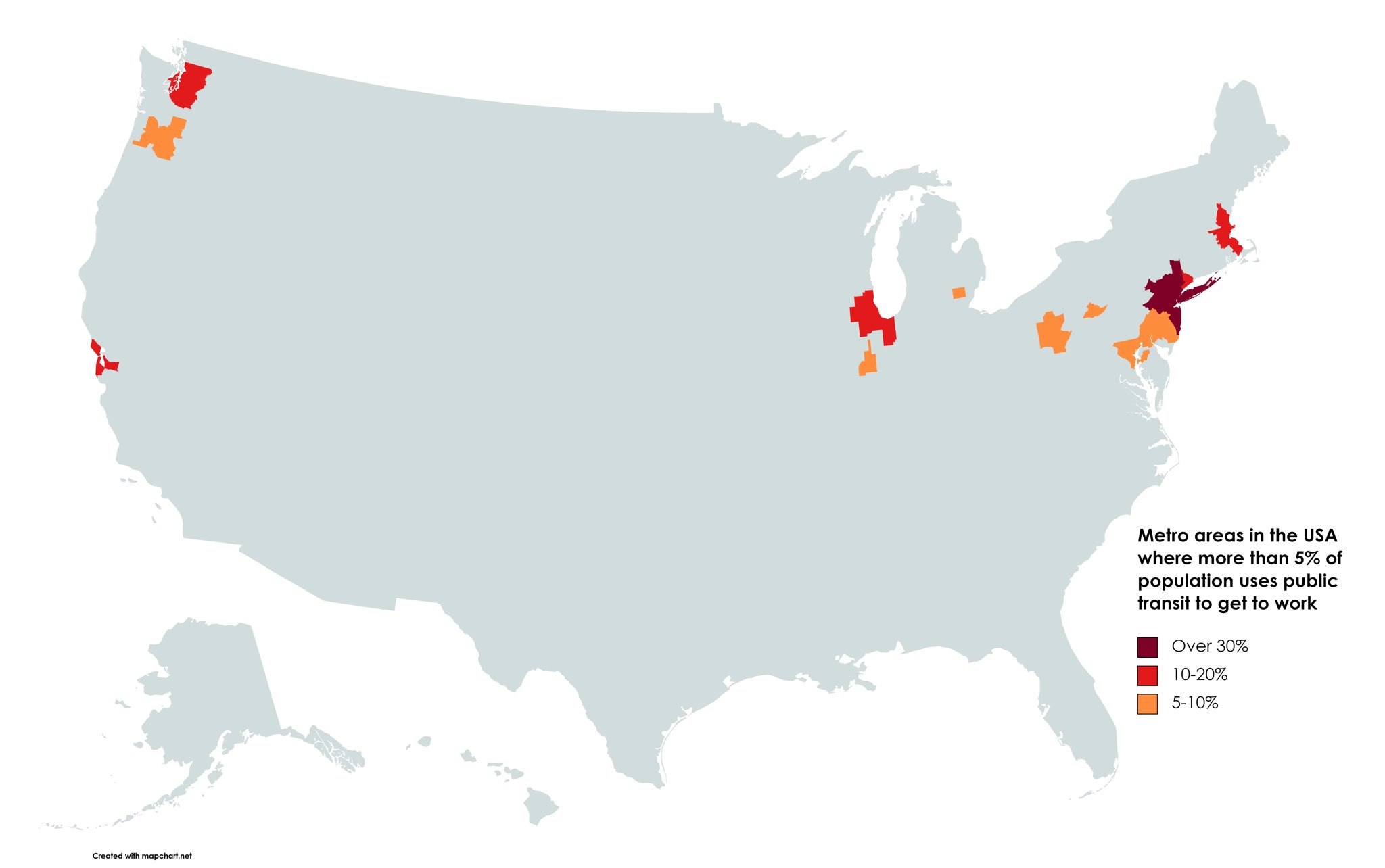For contrast, in big cities in the EU the average is 49%
traingang
Post as many train pictures as possible.
All about urbanism and transportation, including freight transportation.
Home of train gang
:arm-L::train-shining::arm-R:
Talk about supply chain issues here!
List of cool books and videos about urbanism, transit, and other cool things
Titles must be informative. Please do not title your post "lmao" or use the tired "_____ challenge" format.
Archive links for reactionary sites, including the BBC.
LANDLORDS COWER IN FEAR OF MAOTRAIN
"that train pic is too powerful lmao" - u/Cadende
god I wish I lived in EU. but I'm poor and don't have a degree or anything so I can never move there.
Ca na da
Ca na da
Ca na da
Vancouver's sustainable transportation share was like 49% in 2019. Victoria and Montreal are similar. The rate falls as you go further into the suburbs, but that's another problem.
oh really? I live near Victoria (in Nanaimo) and the public transit is absolutely fucking terrible.
I guess if rent prices are ever not insane again in my lifetime then I could move to a larger city in Canada.
Vancouver and Montreal have the most convenient transit systems in North America outside of New York.
Vancouver and Montreal have the most convenient transit systems in North America outside of New York.
shame about the cost of living then, or I'd just move to one of those cities
Yeah, CoL in Vancouver is absolutely fucked. Supposedly it's not so bad in Montreal because they actually have missing middle housing.
Also for contrast, I found comparable government stats for (some) Canadian cities. I guess they follow the typical Canadian pattern of being completely shit compared to the rest of the world, except for the even-shittier USA: Vancouver: 22.5% Toronto: 20.6% Montreal: 16.4%
Wait what the fuck how are there big cities with less than 5%? Automobiles must be destroyed.
My city doesnt even have buses. Like, at all.
SE Virginia has a metro area of almost 2 million people who all drive to work as there is next to no public transit. There is a bus line and it is insanely unreliable, and that is it.
I've lived in multiple metro areas of hundreds of thousands of people with NO public transit.
I now live in Philly and this is the first time I've had the option of not using a car.
My 25 minute commute by car would be 3 hours on public transport, across 4 buses. American cities were expressly designed around the automobile, and are nearly impossible to navigate otherwise.
These savages are failing to utilize the land to its full potential 😤
Which one of these is "New York" idk geography good.
The part in the northeast (top right) that's the only dark red spot. It's the only area in the country where it's over 30%


When is this graph from? I wonder how much WFH impacted this. I USED to take public transit to work but I WFH full time now so I don't commute, so depending on how this study was conducted and when it may not be that accurate.
That's fair, but 5% is still a really low bar.
Source in the comments has similar results taken pre-pandemic, and only 5% of people were working from home at the time.
yeah feels like it should be limited to "commuters" not the whole population.
What are all the cities? I can point out some on a map easily, but not others.
I see Seattle, Portland, New York City, Boston, and Chicago for sure. Possibly Pittsburgh, Ann Arbor, San Francisco, Philadelphia, Washington DC, and maybe Springfield Illinois? A bunch of them are hard to tell without the state borders.
Here's an article with a little more detailed plot : LINK
A bunch of of them are college towns, the one in in Illinois is probably due to UIUC, also Penn State in the middle of PA.
Baltimore is also in the orange splotch.
the red part of connecticut is stamford i'm assuming, it's a city close to new york that's basically mini NYC. i lived there, good amount of people take the train
Are you telling me more than 90% of DC residents drive to work? What?
The metro stations to outer raytheon acres basically put you in the confluence of multiple highways and large multi-lane roads. There's basically no affordable housing being built directly near metro stations. Even the ones put purposefully around some of these dense developments require you to cross like 5 lanes and through some parking lots.
Look up the new stations along the Silverline and the last mile walks you need to do to get anywhere useful.
No, the original source shows DC metro at 10-20%. Op left out DC for some reason.
So it looks like the real cities are Boston, the whole dc-nyc corridor, Pittsburgh, is that state college Pa?, detroit, chicago, Kankakee county??? Wtf??, Seattle, Portland and San Francisco
That’s not Detroit it’s Ann Arbor/Ypsilanti
Kankakee county??? Wtf??,
think you are thinking of urbana-champaign
Oh yeah I think you’re right. Don’t know Illinois too well, was just looking at a map trying to figure out what that was. It seems like there are a couple college towns on there which is interesting but I guess makes sense
Lmao, yeah- that's State College. Though maybe not as good as it was pre-COVID, CATA provides pretty amazing transit coverage, even when compared to other large college towns.
Surprised not to see San Francisco at 30%+. It’s got a great transit system with very high utilization, though maybe it’s regions rather than cities that are analyzed here.
Calling BART and Caltrain "great" is a bit of a stretch.
Even compared to the system in, say, Sydney, it sucks. Heck, it sucks compared to Auckland's famously bad public transit.
Map says metro area so it has to include North and East Bay there
Also doesn't account for all the walkers, bikers, and rollerbladers
show what the entire globe looks like when colored like this. Is it just densely packed redzones with russia the US canada and australia being mostly blank?
Me technically in the area with over 30% public transit ridership 
i deserve to live in seattle (but preferably not seattle but somewhere like olympia)
The public transit in the Seattle area is solidly "pretty good" if you live in the right area. It's continuing to grow as well, if you live in the right area.
As you might guess... I don't live in the right area. And Seattle (sound transit) basically gives you the 🖕 if you don't. But truly, it's actually pretty good if you can take advantage of it.
(It would take nearly 2 hours with no traffic on public transit alone for me to get to Seattle, 20 miles away)
What about 20-30%?
From the original article:
Transit: Five percent of U.S. commuters use transit to get to work. New York City, with its extensive subway and rail system, is the big outlier here—more than 30 percent of workers get to their jobs by transit in greater New York City. The only other metros where 10 percent or more of workers commute via transit are San Francisco (17.4 percent); Boston (13.4 percent); D.C. (12.8 percent); Chicago (12.3 percent); Seattle (10.1 percent); and Bridgeport-Stamford, Connecticut (10 percent).
So, New York is a big outlier at over 30%, the rest of the big cities have between 10 and 20%, and there aren't any cities with 20-30%.
Ah interesting. I think I'd just write "New York" and say the % on the key if I was making that map.
PITTSBURGH AND BALTIMORE FOR THE WIN!!!
Get fucked LA
I got stoned in the wilderness recently and thought about how the United States used to just be vast wilderness. Humans living with nature. No F350s.
Michigan is a whole ass county and bullshit.
Chicago should be higher, as ex-mayor lightfoot said “we are a car city” because 65% of Households had at least 1 car. Not those who are old enough to drive… HOUSEHOLDS.
